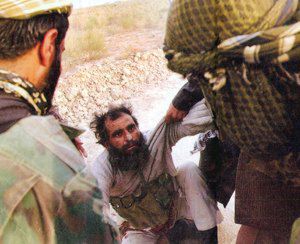By Jamshed Malakzai
In April 1987, Afghanistan ratified the UN Convention against Torture. But it did not stop either the government or its opponents from using the most cruel and inhuman methods to punish and extract information from political rivals. The crimes were never probed; the victims were never compensated. A testimony**
Afghan secret police are accused of torture and homicide of thousands of people during the years of communist party rule in Afghanistan. The anti-government mujahedin were equally savage.
Nayeem Jan, 46, a resident of Shewa district in Nangarhar province, was nearly beaten to death in a prison run by a mujahedin commander. Death would have been an escape from the torture, he says.
He was the star pupil of his school, Sayed Jamaludin High School, and a good trader before the war came to Shewa.
"I graduated in 1977 (two years before the Soviet troops entered Afghanistan). I had many dreams like my peers. I wanted to join the government, and be a good officer but luck did not favour me and I got into business like my father," he says.
Nayeem Jan continued to do business through most of the Soviet years. In 1988, Shewa district was captured by mujahedin, and his life changed forever.
"I was sleeping deeply - it was 5 o'clock early morning that the war started in the district," he says. "We thought of fleeing but nobody could move. The mujahedin had already entered the district governor's building," he adds.

Nov. 26, 2001: Brutalities of the Northern Alliance gunmen against the Taliban fighters who surrendered in Qunduz province.
Nayeem Jan says he had no idea which faction of the mujahedin had captured the district. At nine o'clock the next morning he saw the flag of Gulbuddin Hekmatyar hanging in one of the towers of the district building. "We were very fearful," he recalls. "The mujahedin were searching the houses and asking for guns. They kicked down the door to our house, and a group of armed people entered."
Ruined by war
The next hour was going to be the most tragic in his life. He saw family members being killed; all the family's poultry and livestock were also killed one by one. "My 13-year-old sister was injured seriously. They took my elder brother, two uncles and me. They put my two uncles in a room full of hay and set it on fire, killing my uncles. They said my uncles were communists. Both of them were teachers," he says, sadly.
The mujahedin commander kept Nayeem Jan in a private jail in the Mohammad Gat area of Kunar province. They kept him prisoner for two months, and tortured him to force a confession.
"They were asking me to confess but as I had not done anything wrong I had to deny. They kept beating me till I fainted. I had heard terrible stories of torture of communists, but the torture by this commander was unimaginable. You can still see the marks on my body," he says.
Nayeem Jan has not stopped crying for what the family lost in 1988.
"Our family had good name in Shewa district - we had good flocks (of sheep and goats) and business, we had a bus. But the armed men took everything. We left Shewa district and came to Jalalabad city. Life was very hard," he says.
From Jalalabad Nayeem Jan went to Peshawar.
"I bought a horse, and used to drive a buggy. My brother started work in an iron factory and my father was working as a daily labourer wherever he could find work," he says.
From Peshawar the family moved to Rawalpindi. They lived in utter poverty there for eight years, he says. His father died of a heart attack. After some time his mother also died in a foreign land. Nayeem was now head of a family that included his much younger sisters, and his own five children.
In 1999, the family returned to Afghanistan when Nayeem Jan became its only earning member. His brother was forced out of his job in the factory. "I sold my buggy and horse, and we came back. But the country was hell; there was nothing but war. So we went back to Pakistan, and we became vegetable and fruit hawkers. We would push a cart the whole day," he says.
No reprieve
In 2003, he heard about the new government in Kabul on the radio. He heard stories of how people were being rehabilitated. Almost overnight the family packed their bags and returned to Afghanistan. Nayeem Jan hoped he would get a "good job". But it was not to be so.
Now his sons and he eke out a living as daily wage workers. Without money the poor face double exploitation, he says. "Here in our country, we cannot get the national identity card without money (bribe)," he points out.
"I wish there had been no revolution. The government of Dr Najib (President Najibullah) was better than this government. It was giving ration to all its officers. No one is giving us anything even in the name of God," he says in despair.
** The testimonies of survivors of war crimes are our contribution to creating greater public awareness about people's hopes and claims for justice, reconciliation and peace. These life stories are distributed internationally by the news agency IPS-Inter Press Service and are the basis for a radio drama that is being broadcast by seven Killid radios.



